By Father Anthony Quyet
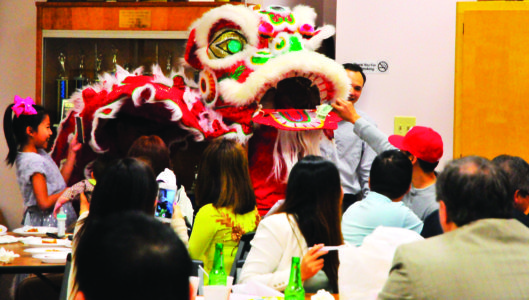
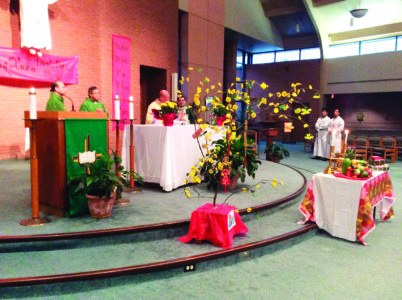
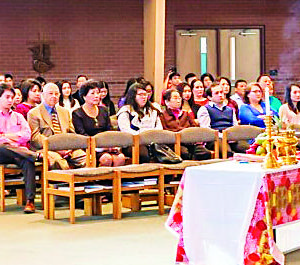
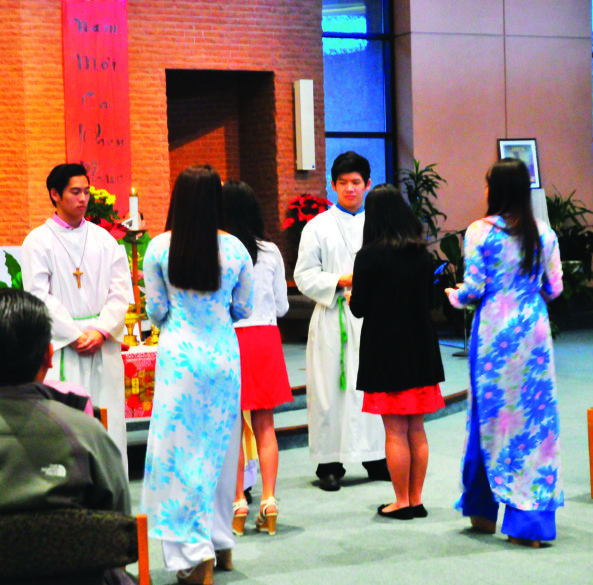
JACKSON – As we have done every year for the last 30 years, the Vietnamese Catholic Community in Jackson came together at St. Therese Parish to celebrate their New Year – called Tet – on Sunday, January 22. Tet is the first moment of the New Year, and its celebration of this Year of the rooster is made more special for several reasons.
We had the special honor this year of including four Vietnamese priests to the celebration: Fathers Peter Phong Nguyen, SVD, Chien Dinh, SVD, Joseph Le and myself.
Tet is the most sacred time and most celebrated holiday for the Vietnamese people. It’s the time set aside to make peace, to reconcile with self, God and others, and to make new resolutions aiming for a better year.
Tet is a combination of Thanksgiving, Christmas, New Year and Memorial Day celebrated here in the United States. Tet is also everyone’s birthday. So on the New Year’s Day, the first greetings are “Chuc Mung Nam Moi!” (Happy New Year) and “Chuc Tuoi Moi!” (Happy Birthday). The blessings of the New Year are expressed through the exchange of best wishes and gifts, especially “Lucky Money” (crisp new money bills in red envelopes).
This is the year of the Rooster. The cycle of animals repeats every 12 years. If we look at life span as 100 years the earliest year of the rooster for most people is 1921. That makes you 96. It
comes back every twelve years. So the next one is 1933, and you are 84; then 1945, you are 72; then 1957, you are 60; then 1969, you are 48; then 1981, you are 36; then 1993, you are 24; then 2005, you are 12.
If you were born in the year of the Rooster, you are observant, hardworking, resourceful, courageous and talented. Rooster people are very confident in themselves, love to talk and like to be the center of attention. They are surrounded by others, whether at a party or just a social gathering.
The rooster has a special place in the Scriptures which have 13 references. Ten of them are related to St. Peter and his triple denial of Jesus. The crow of the Rooster reminds him of the words of Jesus through which he recognized his sins and received not only forgiveness but his mission to continue Jesus’ ministry.
The spirit of Tet celebration is expressed in the way the Vietnamese talk about the holiday. They do not usually say “celebrate,” instead they use the phrase, “eat Tet” in these expressions and their likes, “Do you eat Tet with your family?” or “Where do you eat Tet?” Of course “eat” here means much more than just sharing the food. It means to be with each other to share food, fellowship, support and concerns.
Archbishop Fulton Sheen once asked a missionary who had just returned from one of the islands in the Pacific Ocean what the people whom he served would consider as the greatest virtue. The priest told the archbishop that, in order to help him understand more fully what the people there considered as the greatest virtue, he would tell him what they considered as the worst sin. “To them,” the priest continued, “it is to eat alone.” That’s why a person might go a day without food, until he or she could find someone with whom to share the meal.
Eating in that sense underlines Tet celebration. The customs and traditions during Tet reflect the harmonious bond with heaven, earth and people. It is the time to give thanks to God for his blessings, for the beautiful seasons and their harmonious cycles and for the nurturing fruit of the earth.
Most importantly, Tet is the time to renew and strengthen human relationship. Tet is a big family reunion. Family here is an extended family that includes not only family members but also relatives, neighbors, friends, benefactors and community. Out of this big family reunion everyone offers and receives the three best wishes: happiness, prosperity and longevity. 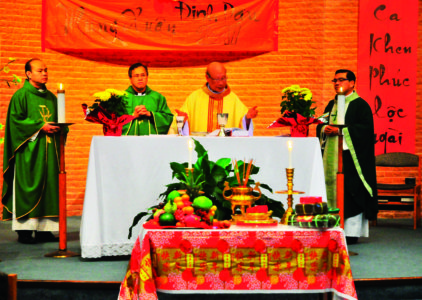
(Father Anthony Quyet is the rector of the Cathedral of St. Peter the Apostle.)
